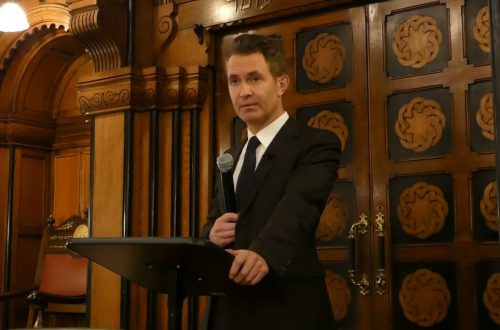Solicitor and author Anthony Julius has written an excellent, extensively-footnoted piece for Z Word about the links between the old fellow travelers of the Soviet Union and the current fellow travelers of contemporary antisemitism.
The first fellow travellers were the early supporters of the Bolshevik revolution. They were non-Party progressives who had, in Trotsky’s phrase, “turned their eyes eastwards” (though over time that came to include China – and then they turned westward, to Cuba). In the main, they were intellectuals. The term did not at first have pejoratives overtones; many progressives were happy to describe themselves as fellow travellers. The fellow travellers of the Soviet Union (“FTSUs”) share many traits with those new anti-Zionists who are also antisemitism’s fellow travellers (“FTASs”).
…FTSUs tended to find the one-party state acceptable “there,” i.e., in Russia, but not here, i.e., in the West. In the received sentiment, it was a solution for them, not for us; we do not need, or even want, it for ourselves; we are different here. Similarly, FTASs tend to find violence against Jews acceptable in Israel, but not here. Indeed, not just acceptable, but justified.
…To the FTSUs, the indiscriminate murder of the kulaks was a necessary harshness. Violence inflicted either in defence or in pursuit of the revolution, and repression in the name of worthy ends, was worthy of endorsement. Similarly, to the FTASs, the indiscriminate killings of Jews by Palestinian suicide bombers are taken to be necessary protests, appropriate retaliations.
Indeed, for some these acts of murder are not crimes, but sanctified acts of resistance. They demand respect, not condemnation. We are invited to find a language free of condescension that will allow us to understand why in a world of rampant inequality and injustice people are driven to do things we hate.
Julius draws an important distinction between flat-out antisemites and the more numerous fellow travelers:
For the first kind, antisemitism determines their positions; they embrace Jew hatred; they acknowledge and welcome the antisemitism of others. For the second kind, antisemitism is not relevant to the positions that they take; they do not recoil from antisemitism when they encounter it; they are insensitive to the presence of antisemitism in their own positions or in the positions that they support. They may not be antisemites themselves, but they collude with antisemitism. They are often found defending antisemites – not guilty of the offence themselves, but quick to champion others who are guilty of it. The distinction I am drawing is between the culpable adoption of antisemitism and a culpable indifference towards it. Many “new anti-Zionists” bear this latter, lesser responsibility. They share space with antisemites, untroubled by the company that they keep; they comprise a species of “fellow traveller” (“bystander” does not quite do the vice justice), the kind of person ready to overlook or excuse everything that is vicious in the cause he supports, the protagonists he admires.
Read it all.


